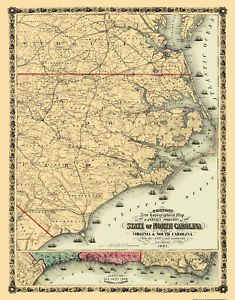 Not all white Southerners are supporters of the Confederacy. Throughout the mountainous regions of the South in particular, an area where slaves are a relative rarity while poor whites struggle to eke out a living from the land, strong pro-Union sentiment was present prior to the war and remains to this day, increasing as the war drags ever on and desertion from the Confederate Army grows.
Not all white Southerners are supporters of the Confederacy. Throughout the mountainous regions of the South in particular, an area where slaves are a relative rarity while poor whites struggle to eke out a living from the land, strong pro-Union sentiment was present prior to the war and remains to this day, increasing as the war drags ever on and desertion from the Confederate Army grows.
This week, the editor of North Carolina Baptists’ Biblical Recorder, J. D. Hufham, invokes the image of the British during the American Revolution in making known clearly that any whites who do not support the slave-driven Confederacy are “traitors.” His anger, in this instance, is directed to certain folks living, or hiding, in the state’s western mountains, where sporadic guerrilla warfare pits Union-loyal bands of North Carolinians (buffalo soldiers, as they are regionally known) against Confederate forces. A letter from a Baptist minister friend in the mountains provides the occasion for condemning unloyal Southern whites.
The traitors who have collected in the mountains of North Carolina, seem to be as brutal and unscrupulous as the Yankees with whom they have allied themselves.–It will be seen from the following statement by a friend living in Madison county, himself a minister, that neither profession, nor sex exempts one from their outrages. He wrote on the 16th inst.:
“The people here have been greatly excited for the last few days. Deserters and disaffected persons have collected in considerable numbers in a section known as Shelton Laurel, and have been committing depredations in different parts of the surrounding country. Recently they stripped Elder L. W. Sams, and two of his brothers, of all that they had in their houses. They afterwards went to Marshall, N. C., took from Mrs. Col. Allen, all her household effects that they could carry off, stole 100 bushels of salt belonging to the county, and then fled to their den.
The people were in a perfect terror for a while, no one feeling safe either at home or abroad. But the alarm has subsided. The citizens are under arms and all feel more secure. Several lives have been threatened, mine among them. But the wretches will soon pay for their temerity. The avenge is after them.”
Since the letter was written we learn that these disturbers of the peace have been dispersed, and some of them have already met a just reward for their deeds of violence.
The Shelton County Massacre, as it becomes known, is in retaliation for the raid upon Col. Allen’s home. The raid had followed a harsh winter in which salt needed to preserve meat was in short supply. In response to the theft, a Confederate infantry unit dispatched from Knoxville rounded up fifteen suspected guilty males (aged 13-60), executing thirteen by firing squad; the remaining two escape. A number of those executed were later determined not to have been involved in the raid.
In the months and years ahead internal skirmishes in the South grow, driven by hardships among the region’s poor white population.
Source: “Tory Outrages in Western North Carolina,” Biblical Recorder, January 28, 1863 (link); “The Shelton Laurel Massacre” (link)


